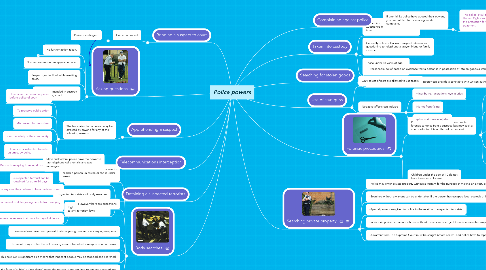
1. Detaining a suspected terrorists
1.1. Detaining a suspected terrorist
1.1.1. A suspected terrorist can be detained for up to 14 days
1.2. Suspected terrorists and body searches
1.3. Rights of individuals in relation to anti-terrorism laws
2. Asking questions
2.1. No further action taken.
2.1.1. Detail 1
2.1.2. Detail 2
2.2. Suspect summoned to appear in court.
2.3. Suspect granted bail while awaiting court.
2.4. Suspect is remanded in custody while awaiting court.
2.4.1. New node
3. Apprehending a suspect
3.1. The law states that a person may be arrested by anyone for any of the following reasons
3.1.1. -To ensure the person appears before police of court
3.1.2. -To preserve public order
3.1.3. -To prevent further crime
3.1.4. -For the safety of the community
3.1.5. -He or she is instructed to make an arrest by police
3.1.6. -Person is escaping from legal custody
4. Body searches
4.1. Police generally do not have the power to search a person unless he or she is under arrest.
4.2. However there are exceptions
4.2.1. -Under new Victorian law police have the power to stop and search anyone in any area they believe to be a problem zone.
4.2.2. These new laws have been passed to deter young people from carrying weapons.
4.2.3. -A problem zone may be an area that has a history of violence.
4.3. These new laws have been passed to deter young people from carrying weapons.
4.4. -The search may involve the police using a wand to detect a weapon or a pat down.
4.5. -This new law is significant as it means that innocent people may be stopped and searched.
4.6. -A search may take the form of a ‘frisk’ or ‘pat down’ where the person is not required to remove any clothing.
4.7. -A Victorian officer may undertake a full search involving removal of clothing.
4.8. -Body cavities are not checked unless written authority is granted.
5. Telecommunications interception
5.1. State and federal police have the power to tap telephone calls, emails and text messages.
6. Bringing a suspect to court
6.1. Crime commited
6.1.1. Police investiagate
7. Taken into custody
7.1. If taken into custody you may be questioned for a 'reasonable amount of time'.
7.2. Generally,police will allow a suspect taken in for questioning to telephone a lawyer, friend or family member.
7.3. Those under 18 years of age must have a parent or guardian present.
8. Searching for stolen goods
8.1. -Reasonable belief based on evidence that a person is in possession of stolen goods a warrant can be issued to seize such goods.
8.2. -A member of the police, of the rank of inspector can provide a constable with written authority to search for stolen goods.
9. Forensic procedures
9.1. Police have the power to obtain non-timate forensic samples from a suspect, but may seek a court order to obtain others if no consent.
9.1.1. Role of DNA in cases
9.1.2. Photographs
9.1.2.1. Police, generally, take photographs for identification purposes. A suspect does not have to comply.
9.1.3. Identification parade
9.1.3.1. Police can ask a suspect to participate in an identification parade but the suspect has the right to refuse.
9.1.4. Forensic dentistry
9.1.5. Finger printing
9.1.5.1. Police have the power to get fingerprint from any one aged 15 years and over without consent.
9.2. Children under the age of 10 do not have to undergo forensic procedures.
10. Searching private property
10.1. -Police may enter private property without a warrant for the purpose of making an arrest, or under the belief an indictable offence has occurred.
10.2. -Searches without a warrant can be undertaken if the person has escaped legal custody or is in the process of committing an indictable offence.
10.3. -Special powers are given to police in the relation to suspected terrorists.
10.4. -In Victoria police can search a home without owners knowledge if there is reasonable suspicion of terrorist activity.
10.5. -A warrant from The Supreme Court must be sought before search, and police have to report back within 7 days.
11. Use of stun guns
11.1. Only select officers are allowed to use tasers.
11.2. Negative affects can include
11.2.1. minor burns, lacerations, eye injuries
11.2.2. Injuries from faling
11.2.3. spinal and muscle injuries
12. Complaining against police
12.1. If one thinks police have abused their powers, you are entitled to make a legitimate complaint.
12.1.1. The police, at all times must comply with the Charter of Human Rights and Responsibilities Act 2006, which is the protection form cruel, inhumane or degrading treatment.
